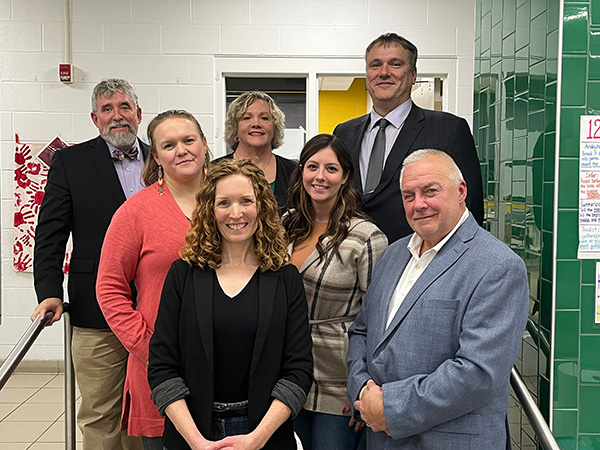|
Board of Education Members
|
|
| Ronald Shawn Reyburn | Sarah Stanton |
| Larkin Podsiedlik | Amy Roe-Ryan |
| Jody Gates | Anthony Moore |
| Michael LaCava | |

How quickly are the Board of Education Minutes posted?
According to the Board of Education Policy, minutes shall be available to the Public within two weeks following the date of the meeting. These minutes, so marked as draft copies, will be available in the School District Offices. Officially approved Board of Education Minutes will be posted at the Board of Education Website.
What is the Board of Education?
The Board of Education carries one of the most important responsibilities that can be assigned to any citizen group: helping to plan the education of the state's youth. School Board members are NYS officials. Board members receive no pay for their service except the satisfaction that comes from rendering an indispensable public service.
What does the Board of Education do?
The School Board sets goals and establishes policy for the school system. All board decisions should follow logically from the board's delineated goals and objectives as stated in the district's Policy Manual. Board members are expected to make decisions on a wide range of problems. Some decisions are strictly routine, while others are somewhat more complex; some are extremely important and some may result from lesser concerns.
An important duty of board members is to approve the budget and spending priorities of the district; at the same time, seek to ensure adequate local, state and federal revenues to support the budget. The board should refrain from becoming involved in the day-to-day operation of the school, but it should follow up on the administration and operation of the school and require periodic reports for purposes of evaluation.
Perhaps the most important work a board member can do is to help build the community's support and understanding of public education. This means serving as a link between the school and the public and interpreting the schools to the public and the public to the schools.
Who can be on the Board?
School board candidates must be at least 18 years old, qualified voters in the school district and able to read and write. They must be residents of their districts for 1 year before the election, and cannot be employed by the board on which they serve or live in the same household with a family member who is also a member of the same school board.
Residents of the Onondaga Nation are considered residents of the school district. According to Section 2102 of Education Law: "Every school district officer must be able to read and write and must be a qualified voter of the district; and each member of a board of education of a central school district shall have been a resident of the school district, or in the case of a person qualified by subdivision three of section twenty hundred twelve of this chapter to vote in a district election, a resident of the district or reservation, for at least one year."
How do you get on the Board?
Candidates must submit a nominating petition to the school district clerk. Forms are available in the District Office. The petition must be signed by at least 25 qualified district voters. This petition must be filed with the district clerk at least 30 days before the election meeting, between the hours of 9:00 a.m. and 5:00 p.m. Newly elected board members are required to take the following oath of office when starting their term, "I do solemnly affirm that I will faithfully discharge the duties of the position of Board of Education member according to the best of my ability, and perform my duties in a manner consistent with the constitution of the United States and constitution of the state of New York."
Can residents of the Onondaga Nation vote in Board elections, budget votes, capital project votes, etc.?
Residents of the Onondaga Nation are eligible to vote in the board election, budget vote, and capital project votes. Section 2012 of Education Law, states the following: "No person shall be deemed ineligible to vote at any such meeting or election, by reason of sex, who has the other qualifications required by this section; and notwithstanding the foregoing provisions of this section, no Indian eighteen years of age or over who, having been born in the United States to a member of an Indian tribe, or having been naturalized or otherwise acquired citizenship, shall have resided on an Indian reservation in the state for a period of thirty days next preceding the meeting or election at which he offers to vote or the spouse of such Indian shall be deemed ineligible to vote at any such meeting or election of the school district where the majority, as determined by the commissioner, of the Indian children of such reservation are being educated under a contract pursuant to subdivision two of section forty-one hundred of this chapter, except that the parents or guardians of Indian children of such reservation who are being educated in the schools of a district other than the district which educated the majority of such children, shall be eligible to vote only in the district where their children are being so educated."
What are the responsibilities of being on the Board?
The School Board is a corporate entity with duties and mandates prescribed by law, but its leadership stems from commitments to children, learning and the community. Being a School Board member means that you are responsible for a multi-million dollar corporation. Although it is a volunteer position, it's duties are extremely important and essential to the functioning of this community educational resource. It is not a position to be taken lightly.
Board duties:
1. Attend and participate in board meetings on the 2nd and 4th Thursday of the month.
- Read the board packet ahead of time.
- Familiarize yourself with important issues.
2. Attend additional Board work sessions as called.
3. Participate in at least two different subcommittees.
4. Spend time in the district in order to facilitate a greater understanding of the day to day functioning of the schools.
Can community members attend Board meetings?
Yes. Board meetings are open to the public but there is only a short opportunity at the end of each meeting to share public concerns. The rest of the meeting is held in public, but is not an appropriate time for community interaction.
If I have concerns to present to the Board, what is the appropriate action to take?
If your issue is about student related problems the appropriate process to have your concerns addressed is:
1. Contact your student's teacher to see if the issue can be appropriately dealt with.
2. If the issue cannot be adequately resolved, contact the building Principal.
3. If the issue remains unaddressed, contact the Superintendent.
4. If the issue remains unresolved, it is appropriate to address the Board of Education with your concerns. This communication can take place either in the form of a letter to the Board, or you can present your concerns in person. Since some things are not appropriate to discuss in a public forum, you may request in writing a private meeting with the Board. The Board, at their discretion, has the right to grant such sessions.
How can I watch regular board of education meetings online?
The Board of Education of the LaFayette Central School District (the "Board") has imposed the following requirements governing the use of videoconferencing by the Board to conduct open meetings, under "extraordinary circumstances," regardless of a declaration of emergency:
1. This procedure is required by Public Officers Law §103-a ("POL §103-a") and remains valid unless otherwise modified or extended.
2. Only those Board Members meeting in person together, or at remote locations with public access shall count towards the quorum meeting requirements.
3. The Board, in its discretion, may allow its members to participate remotely, under extraordinary circumstances so long as there is a quorum of members gathered at a physical location or location open to the public.
4. The public shall have in-person access to any locations of the Board meeting, except for locations of those board members experiencing "extraordinary circumstances."
5. "Extraordinary circumstances" is defined by the Board as disability, illness, caregiving responsibilities, or any other significant or unexpected factor or event which precludes a Board Member's physical attendance at such meeting.
6. The Board shall not disclose those "extraordinary circumstances" which preclude a Board Member's physical attendance at such meeting unless compelled to do so by law or upon the consent of the affected Board Member.
7. The Board shall give the public notice when holding a meeting by video conference pursuant to POL §103-a and such notice shall include a link where the public can view, listen, and when applicable, participate in such meetings. It shall also identify what documents and records will be posted or available and identify the physical location for the meeting where the public can attend.
8. Minutes of a meeting involving video conferencing shall include which, if any, member participate remotely and shall be available to the public.
9. Each meeting conducted using video conferencing shall be recorded and such recording shall be posted or linked to the District's website within five (5) business days following the meeting and shall remain so available for a minimum of five (5) years. Such recording shall be transcribed upon request.
10. The foregoing provisions related to public access shall not be required pursuant to a state disaster emergency declared by the Governor of New York, or a local state of emergency proclaimed by the Chief Executive of the County or local municipality, when such emergency would hinder the ability of the Board to hold an in-person meeting.





